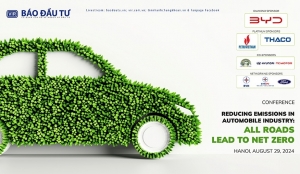Proposals looked at to change registration fees for certain EVs
Tran Thi Bich Ngoc, head of the Department of Administration Supervision on Tax, Fees and Charges under the Ministry of Finance (MoF), stated that current incentives for electric vehicles (EVs) in Vietnam are not lower than those offered in other countries in the region.
Bich Ngoc made the comments at a conference on reducing emissions in the automotive industry, hosted by VIR on August 29.
 |
| Tran Thi Bich Ngoc, head of the Department of Administration Supervision on Tax, Fees and Charges under the Ministry of Finance |
“The MoF's policies moving forward will prioritise and support sectors that reduce carbon emissions, including promoting the development of EVs. This will be achieved through various tax, fee, and land rent policies aimed at boosting investment in manufacturing, assembly, and encouraging environmentally friendly vehicles,” said Ngoc.
For batteries, a list of high-tech industries prioritised for investment and high-tech products, including fuel cells and lithium batteries with high performance, large capacity, long lifespan, safety, and environmental friendliness, has been issued. All applicable taxes are currently set at the highest preferential rates.
Ngoc shared that the MoF has submitted a draft of the Law on Special Consumption Tax (SCT) to the government and National Assembly. Under this law, the SCT for EVs will be significantly lower, around 1-3 per cent until March 2027, after which it will increase to 4-7 per cent.
In contrast, fossil fuel-powered vehicles will be subject to a SCT of 35-150 per cent, depending on the vehicle type.
In addition, hybrid vehicles also receive significant incentives, though not as high as those for EVs. The law currently imposes a tax rate of 70 per cent compared to fossil fuel-powered vehicles of the same type. For vehicles running on biofuels, the tax rate is only half of that applied to gasoline-powered vehicles of the same type.
“Regarding the environmental protection tax, it only applies to petrol, oil, and grease derived from fossil sources, and not to those made from biofuels. Additionally, in the near future, the MoF will also consider registration fees for battery-electric vehicles,” said Ngoc.
In addition, automotive manufacturing and assembly enterprises that invest in areas with difficult or especially difficult socioeconomic conditions are exempt from import taxes on machinery and equipment used to create fixed assets for projects in these regions. Land taxes, corporate income taxes, and other taxes and fees are also offered at the highest preferential rates.
“These policies have been fully implemented. In the near future, the MoF will study ways to support both the public and businesses, as well as vehicle manufacturers, for both electric and hybrid vehicles,” she added.
 | Supporting a green strategy for the automotive industry With 6.5 million cars and 74 million motorcycles, Vietnam is the second-largest emitter of greenhouse gases (GHGs) from road transport in Southeast Asia, following Indonesia. Emissions from road vehicles in the country are rising rapidly, with an average annual increase of about 15 per cent over the past decade. |
 | Long road ahead to green the vehicle industry Greening the automotive industry in Vietnam is the only way towards its sustainable development, a conference on the issue has heard. |
 | Vietnam formulates policies to promote shift to EVs Vietnam is gearing up to create more policies to encourage the sustainable development of the transportation sector, with a focus on electric vehicles (EVs). |
What the stars mean:
★ Poor ★ ★ Promising ★★★ Good ★★★★ Very good ★★★★★ Exceptional
Related Contents
Latest News
More News
- Bac Ai Pumped Storage Hydropower Plant to enter peak construction phase (January 27, 2026 | 08:00)
- ASEAN could scale up sustainable aviation fuel by 2050 (January 24, 2026 | 10:19)
- 64,000 hectares of sea allocated for offshore wind surveys (January 22, 2026 | 20:23)
- EVN secures financing for Quang Trach II LNG power plant (January 17, 2026 | 15:55)
- PC1 teams up with DENZAI on regional wind projects (January 16, 2026 | 21:18)
- Innovation and ESG practices drive green transition in the digital era (January 16, 2026 | 16:51)
- Bac Ai hydropower works stay on track despite holiday period (January 16, 2026 | 16:19)
- Fugro extends MoU with PTSC G&S to support offshore wind growth (January 14, 2026 | 15:59)
- Pacifico Energy starts commercial operations at Sunpro Wind Farm in Mekong Delta (January 12, 2026 | 14:01)
- Honda launches electric two-wheeler, expands charging infrastructure (January 12, 2026 | 14:00)

 Tag:
Tag:




















 Mobile Version
Mobile Version